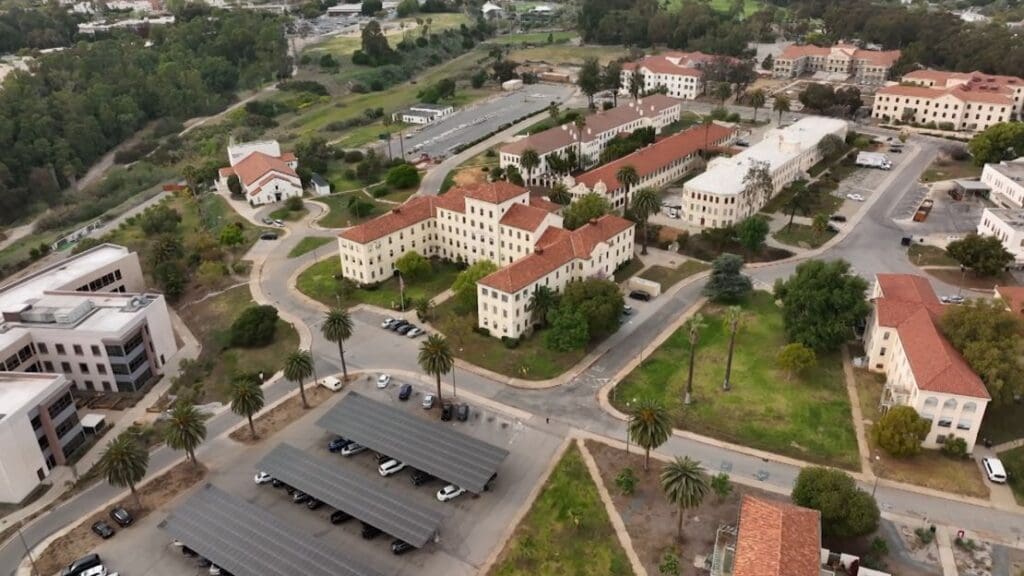
This is the north campus of the West L.A. VA. Judge David O. Carter gave an order to the VA to build 1,800 additional units of supportive housing for veterans.
(Editor’s note: The story “Housing for Los Angeles’ Homeless Veterans in Hands of Ninth Circuit Court” appeared on April 9 in the Westside Current and is reprinted with permission. As background, a lawsuit (Valentin v. Shinseki) was brought in 2011, and when it was settled, the exodus of non-veteran organizations began. Over the years, non-veteran entities, including the City of Los Angeles, UCLA, Brentwood Schools, Sodexho Marriot Laundry Services, UC Regents, Twentieth Century Fox Television, Veterans Park Conservancy, Westside Breakers Soccer Club, Salvation Army, Westside Services, a native plant garden and a parrot sanctuary, had space on campus.
It was unclear where the money went from those rentals, but in 2018, Richard Scott, who leased a parking lot on the land, was imprisoned and Ralph Tillman, who managed lease contracts for the VA, was jailed and admitted taking more than $250,000 in bribes.
By the time of the settlement, the farmers market, Richmark, Sodexho Marriott and Twentieth Century Fox had already left the Campus. The Salvation Army, Westside services and the Tumbleweed Bus company were gone by August of 2017. Left on campus were an oil company, UCLA and Brentwood School.)
BY JAMIE PAIGE
The Ninth Circuit Court of Appeals on Tuesday heard arguments in a high-profile appeal over a federal judge’s sweeping order requiring the U.S. Department of Veterans Affairs (VA) to build nearly 1,800 additional units of permanent supportive housing for unhoused veterans on or near its sprawling West Los Angeles campus.
The order, issued by U.S. District Judge David O. Carter, came after he found the VA had mismanaged the 388-acre Brentwood property and failed to meet its obligations to chronically unhoused veterans, many of whom are disabled and in need of long-term medical care. But federal government attorneys argued the ruling exceeds judicial authority.
“The remedies here are what cause me concern—the reach of what Judge Carter is trying to do,” a Ninth Circuit judge said during oral arguments. “It basically says that Judge Carter is now going to run the VA.”
The appeal does not challenge Carter’s findings on land misuse—such as long-term leases with UCLA, Brentwood School, and oil drillers—but instead targets his legal authority to impose a housing mandate and void existing leases under the Rehabilitation Act and a charitable trust claim tied to an 1888 deed that granted the land to the federal government for the care of disabled veterans.
Government lawyers said Judge Carter lacked jurisdiction to enforce such claims and had no authority to compel the construction of housing units.
“There is no statutory basis for a court to supervise the agency’s leasing or compel it to build housing on this scale,” a Justice Department attorney said. “The Rehabilitation Act and trust claims both fail on jurisdictional and legal grounds.”
Veteran advocates representing the plaintiff class pushed back, saying the VA’s continued leasing of land for private use—such as athletic fields and drilling operations—while thousands of veterans remain unhoused violates the spirit and letter of the law.
“There are only about 379 available units on or near the campus,” one attorney argued. “The court didn’t unilaterally order construction. It ordered a plan—collaborative and flexible—to meet the overwhelming need for supportive housing that ensures access to the on-campus medical center.”
Under Carter’s ruling, the VA must collaborate with plaintiffs and a court-appointed monitor to develop the plan and timeline, with jurisdiction retained to modify the scope based on demonstrated need.
Ninth Circuit judges also questioned whether the injunction overstepped by banning future leases outright and barring activities such as slant oil drilling, even when such agreements provide revenue used for veteran transportation services.
Attorneys for UCLA and other lessees argued that their leases were either explicitly authorized or provided substantial indirect benefit to veterans. One attorney said voiding leases without due process constituted an abuse of discretion.
The court also considered whether the plaintiff class should have been certified under the Rehabilitation Act, with government attorneys claiming individual circumstances must be evaluated separately to determine whether any veteran was denied meaningful access to care.
A Ninth Circuit judge questioned whether the district court could have issued a narrower injunction that enforced lease compliance with the West Los Angeles Leasing Act, without imposing long-term oversight of VA operations.
Plaintiffs countered that after decades of failures, stronger measures were necessary.
“This is the only place in the country where veterans with traumatic brain injuries, PTSD, and other complex conditions can receive the care they need,” a plaintiff attorney said. “The land was given for that purpose. The government has consistently failed to use it accordingly.”
A ruling from the Ninth Circuit is expected later this year. The outcome could have major implications for how federal agencies address homelessness among veterans—and how far courts can go to enforce those responsibilities.

Such an important story that impacts so many lives which need help NOW.